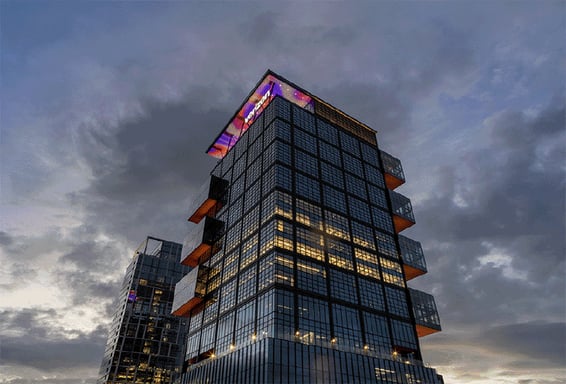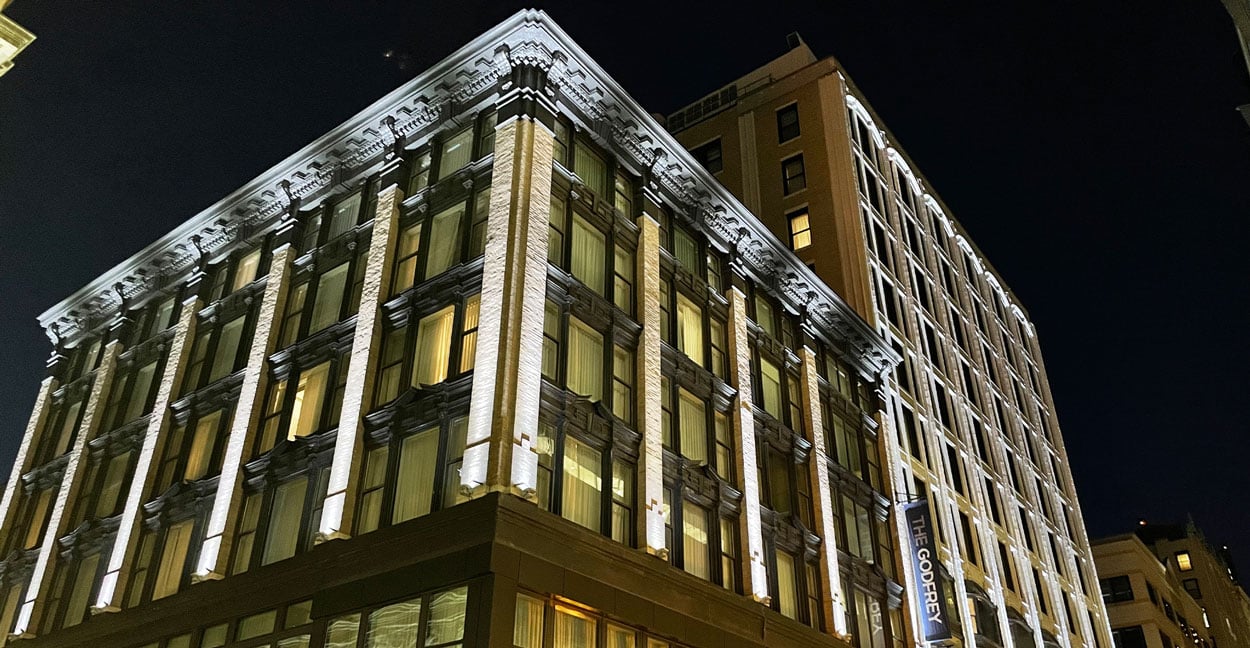by PORT on Jul 18, 2023 12:16:15 PM

Pictured here is the the Hub on Causeway in Boston, MA. PORT handled the controls for the building owner and worked with other integrators to ensure all systems tied together.
Learn from PORT's own John Beaulieu on the importance of lighting controls and how they can help your building, business, and life.

July 2023 - Lighting controls whether outdoor lighting control systems or indoor lighting control systems are an essential aspect of any building.
Custom lighting control systems offer numerous benefits including:
- Energy Efficiency
- Ease of Use
- Cost Savings for Business Owners
- Greater Control
Occupancy/Vacancy Control: Allows for the use of motion sensors to automatically turn lights on and off as people enter and exit a room, reducing energy waste and costs.
Daylight Harvesting: This takes advantage of natural light by adjusting artificial light levels based on the amount of sunlight entering a space, further reducing energy consumption.
Automated Light Level Changes: Changes can be programmed to adjust based on the time of day improving the overall lighting experience and reducing energy consumption.
Health-Centric Lighting: These are lighting systems that are designed to support human health and well-being. This includes:
Lighting systems that promote healthy sleep-wake cycles by simulating the natural progression of daylight. These systems can be adjusted to provide optimal lighting levels for specific tasks or activities.
With the increasing recognition on the importance of lighting affecting human health, custom lighting control systems that prioritize health-centric lighting are becoming more popular.
Remote Monitoring and Cloud-Based Control/Service:
These are important features of custom lighting control systems. Remote monitoring allows building managers to monitor and control lighting from anywhere with just an internet connection, providing greater flexibility and convenience.
In addition, cloud-based systems provide automatic software updates and real-time data. This allows building owners to quickly identify and resolve any lighting issues. Last-minute schedule change or programming?
No problem with remote access!

CUSTOM GUIS (GRAPHICAL USER INTERFACES):
Custom GUI’s allow us to tie the color of a building into corporate branding as well as local events/fundraisers. Did you know a building’s lighting can be changed to match anything from a company’s logo colors for a special event to the colors of a local sports team during a game!
IMPORTANT FEATURES ON CUSTOM GUI’S INCLUDE:
Custom Dashboards:
Dashboards give greater access to lighting systems without needing to learn any software in order to make simple changes.
Custom Calendars:
Calendars allow building owners to schedule lighting changes in advance, ensuring that their lighting is perfectly timed for any special event.
Graphical Representation of the Installation:
A graphical representation of the lighting installation allows building owners to pre-visualize custom presets and lighting scenarios. This makes it easier to design and create the perfect lighting experience.
Ease of Use:
Custom GUIs give people the ability to operate with little technical training. They include intuitive interfaces and clear visual representations of the lighting installation which allow for easy control and management.
Logging and System Health:
Custom GUIs also provide logging and system health information which allows building owners to monitor system performance and quickly identify any issues. This information can be used to optimize system performance, reduce energy costs, and extend the lifespan of the lighting installation.
Custom lighting control systems also offer the ability to integrate with a variety of other systems, further enhancing the lighting experience and creating a truly smart building.
SOME OF THE MOST POPULAR INTEGRATIONS INCLUDE:
Shade Controls: Integrating with shade controls allows building owners to control the amount of natural light entering a space, further reducing energy costs and improving comfort levels.
Building Management System Integration: By integrating with a building management system, custom lighting control can be integrated with other systems such as HVAC, security, and energy management, providing a more comprehensive and integrated building management solution.
Sound Integration: Integrating lighting with sound systems allows building owners to create dynamic and immersive experiences, such as syncing lights with music during concerts or events.
Weather Integration: Integrating lighting with weather data can help to create a more dynamic and responsive lighting experience. For example, lights can be dimmed in response to overcast weather conditions or brightened in response to sunny weather.
Stock Price Integration: Integrating lighting with stock prices can provide real-time updates on financial performance, and create a dynamic visual representation of market trends.
Tide Integration: Integrating lighting with tide data can provide a unique and dynamic lighting experience for coastal buildings, allowing lights to respond to changes in tide levels and create a visual representation of oceanic movements.
Click here to read the full article.
LIVE
THEATRICAL LIGHTING
ARCHITECTURAL LIGHTING
LIGHTING CONTROL SYSTEMS






No Comments Yet
Let us know what you think